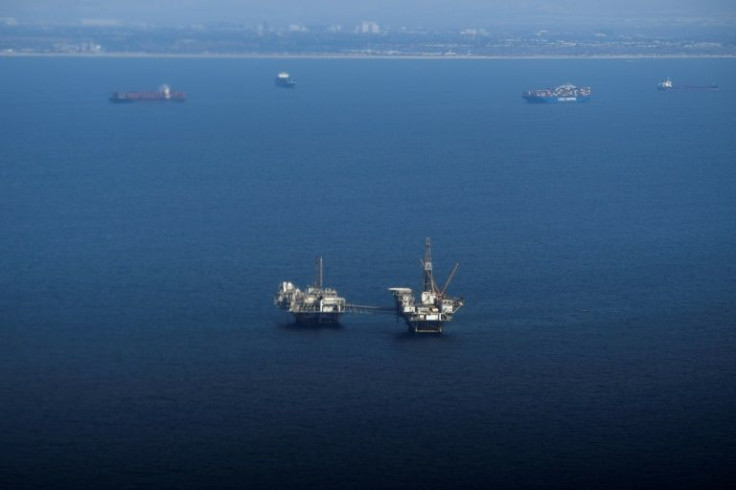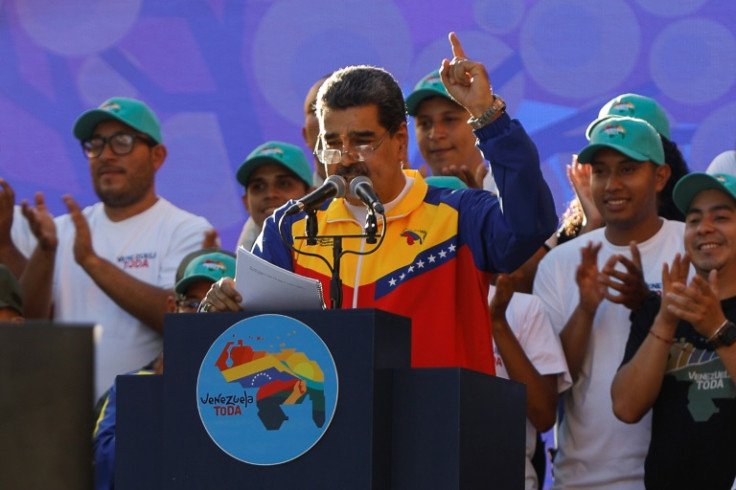Venezuela's Guyana Annexation Referendum Leaves Region On Razor's Edge

Venezuela moved closer toward initiating Latin America's first inter-state military conflict in nearly 30 years Sunday, as voters approved plans to formally annex the disputed oil-rich western half of neighboring Guyana.
The controversial referendum passed with over 90% of the vote, according to Venezuela's National Electoral Council. Government authorities claimed that more than 10 million people participated in Sunday's vote, a figure that would exceed turnout even at the height of former president Hugo Chávez's popularity in the early 2000s; independent observers noted strikingly low attendance at polling stations across the country.
The vote does not commit President Nicolás Maduro's regime to taking any military action against Guyana, which has controlled and administered the sparsely populated Guyana Esequiba region since 1899 under British and later independent administration. The Venezuelan government now will formally recognize Guyana Esequiba as a federative state, which experts argue will provide a pretext for future military incursions.
Guyana Esequiba accounts for 74% of Guyana's total current land area and less than 25% of its population. Control of the region's coastline would, in theory, grant Venezuela access to the offshore Stabroek oil block, the site of Guyana's recently-discovered oil reserves (estimated at over 8 billion barrels).
The non-binding referendum consisted of five questions, including whether to formally disregard the authority of the International Court of Justice (ICJ) and whether to extend immediate citizenship to the residents of Guyana Esequiba. All five questions were approved, according to Venezuela's electoral authority.
"It has been a total success for our country, for our democracy," President Nicolás Maduro told supporters in Caracas on Sunday.
On Friday, the ICJ officially condemned any future military action against Guyana, but ruled that the referendum could still take place under international law, since the results are not technically binding.
Guyana's Oil Boom Thrown In Doubt

Guyana is home to the fastest growing economy in the world on the basis of GDP per capita, thanks primarily to surging oil output from projects in the Stabroek Block.
ExxonMobil, Chevron and CNOOC currently operate three active offshore oil platforms in the Stabroek block responsible for over 600,000 barrels per day of crude oil production. ExxonMobil has the largest stake in the venture (45%) and is the project's principal operator.
Venezuela's daily oil output has been between 700,000 and 850,000 barrels in 2023, up from recent years as the country benefits from temporarily relaxed and/or suspended US sanctions.
The looming prospect of a Venezuelan invasion casts the shadow of political risk over Guyana's booming oil industry.
"I'm not sure the press has captured the true intensity of the situation there, but we're keeping an eye on it," ExxonMobil CEO Darren Woods said during an interview at COP28 on Monday.
ExxonMobil representatives declined to directly comment on the referendum's impact on their operations, saying "we believe border issues are matters for governments and appropriate international organizations to address" to International Business Times on Monday in written comments.
Neither Chevron or CNOOC immediately responded to detailed requests for comment from IBT.
Imminent Invasion?

As of Monday afternoon, Venezuela has not begun the mass movement of military forces necessary to begin an invasion. Last week, the Brazilian military mobilized an undisclosed number of troops along their northern border with Venezuela and Guyana.
"I want to assure Guyanese there is nothing to fear over the next number of hours, days, months ahead," Guyanese President Irfaan Ali said in a televised address on Sunday evening.
Independent experts and critics of the regime have characterized the Guyana annexation referendum as a diversionary tactic intended to deflect attention from Venezuela's lingering economic woes and numerous confirmed human rights violations under Maduro's presidency.
"An authoritarian government facing a difficult political situation is always tempted to look around for a patriotic issue so it can wrap itself in the flag and rally support, and I think that's a large part of what Maduro is doing," Phil Gunson of the International Crisis Group told CNN on Sunday.
CARICOM, the Caribbean inter-governmental organization of which Guyana is a full member and Venezuela is an observer, issued a statement on Friday condemning the legality of Sunday's referendum and deferring final authority over the long-standing border dispute to the ICJ.
The Maduro regime made international headlines again last Friday, when it formally opened a legal pathway for the candidacy of María Corina Machado, the leading opposition candidate ahead of elections scheduled for 2024 whose participation is currently prohibited. This was a key stipulation of temporary US sanctions relief on Venezuela's oil sector, announced in Barbados in October.
It's not clear whether the immediate impact of the Guyana Esequiba referendum will in any way affect the ongoing review period for US sanctions on Venezuela's oil industry. The US State Department told Reuters on Monday that "it supports a peaceful resolution of the dispute and that the issue could not be solved by a referendum."
This article was republished to incorporate comments from ExxonMobil.
© Copyright IBTimes 2024. All rights reserved.












